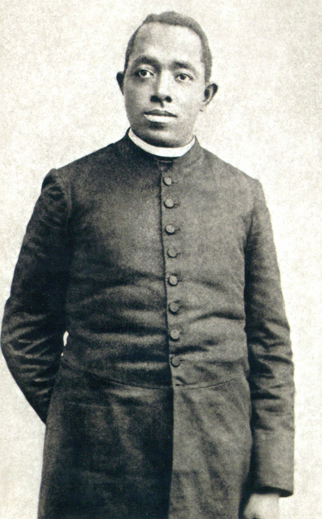
Servant of God Father Augustus Tolton
The Archdiocesan Office for Black Catholics has announced three winners for its 2019 World Youth Day Essay competition, which was open to active Catholic students who are members of archdiocesan parishes and attending high schools, colleges or universities.
The winners will receive a free trip to the World Youth Day scheduled in Panama in January 2019.
The competition was funded by the Martin de Porres Foundation and the topic of the essay would be on one of the five African Americans from the past who have causes for canonization in progress. The five were Father Augustus Tolton, Henriette DeLille, Mother Mary Lange, Julia Greeley and Pierre Toussaint.
“It is my hope that the World Youth Day Essay Contest served as an inspiration to explore the lives of the holy men and women on the road to sainthood,” said Father Richard Owens, O.F.M. Cap., the director of the archdiocesan Office for Black Catholics. “In reading the lives of the five individuals on the road to sainthood, one quickly realizes that the common thread is perseverance in the midst of struggle.
“Furthermore, the lives of the five individuals are a reminder that holiness is attainable for married men, religious women, priests, the educated and the under educated.”
Interestingly, two of the winners chose to write on Julia Greeley, who lived from the mid-1800s to 1918, and the other on Father Augustus Tolton, 1854-1897, who is recognized as the first African-American priest in the U.S., although others ordained ahead of him had mixed Caucasian-African heritage and passed for white.
[hotblock]
Christiana Cruz, a parishioner of St. William’s in Philadelphia and a senior at Scranton University, was recommended by faculty member Tracy Muth who described her as “an intelligent, genuine, friendly and reliable student.”
“Academically Chris has proven herself time and time again,” Muth wrote. “She is majoring in communication law with a minor in history. Her outgoing personality and compassionate heart will certainly be great assets on her chosen path.”
Writing on the life of Julia Greeley, who was born in slavery in Hannibal, Missouri and migrated to Denver after emancipation, Cruz noted her great charity: “She would beg on the streets, but never for herself, though she was very poor. Julia asked for anything that she could fit in her little red wagon. She was often seen traveling through the streets after dark with her red wagon full of her daily charities. Her kindness knew no bounds. She even went so far as to make sure that when she was handing out her collections she did it at night and in dark alleyways. She didn’t want the poor to be embarrassed by being helped by a black woman.”
Olivia Chandler, who also wrote on Julia Greeley, was recommended by her pastor at St. Raymond Parish, Philadelphia, Father Christopher Walsh.
[tower]
“Olivia is faithful to attending Mass, seeks to model her life on Christ, is an amazing sister to her brothers and a wise friend to many,” he wrote. “The experience of the global church during these three days in Panama will further confirm her life as a Christian and member of our church.”
In her essay, Chandler wrote, “Julia Greeley inspires me to act justly, love goodness and walk humbly with my God for several reasons. First, Julia is a prominent example of doing God’s mission. Catholics are taught to reflect God through his teachings.
“That is exactly what Julia did throughout her life on earth, whether to be avoiding embarrassing poor white families by helping them at night or purchasing clothes and food for the needy. Julia influences me to always prioritize other people’s needs before my own. More specifically those who are underprivileged.”
Cameron James, who wrote on Father Augustus Tolton, is a sophomore at Archbishop Ryan High School. He was recommended by his honors history teacher, Douglas MacMaster, who described him as “very thoughtful and deliberate in his actions.”
Also, “he is active within his parish” and “he extends his activities beyond the door of the parish and he volunteers at a homeless shelter in Kensington.”
In his essay James spoke of the prejudice Father Tolton faced: “In spite of all the hate, he did not complain about his situation. Father Augustus’s faith and his devotion to the priesthood encourages us to see God in our lives and to have trust in him. All through the insults and hatred, he kept his priestly values. Father Augustus believed in change as did the cardinal who ordained him, who said, ‘America needs more negro priests.’”
There is no question that the five potential saints from the past which the students considered remain role models for this generation.
PREVIOUS: Bishop DeSimone, hero to Italians, beloved by all, goes home to God
NEXT: Live video: Funeral Mass for Auxiliary Bishop Louis DeSimone



I have been praying to Augustine Tolton for years. I was a contributor to the school when the parish took over the cost of running the school. God bless the students and Father Tolton.